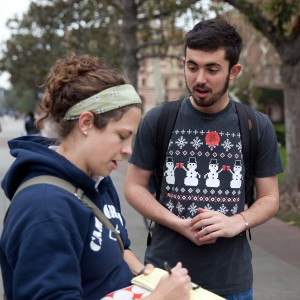SCALE petitions against USC sweatshop affliation
The Student Coalition Against Labor Exploitation launched a campaign, “End Deathtraps Vote,” this week to stop USC from contracting with sweatshops that make college apparel.

Activism · Junior Matthew Shoemaker (right), a member of SCALE, talks with Leanne Tracy (left), a missionary, as she signs the petition. – Ralf Cheung | Daily Trojan
The campaign is working toward acquiring student signatures for a petition requesting that USC only work with companies whose factories in Bangladesh adhere to a recently written safety accord, the Accord on Fire and Building Safety in Bangladesh.
The agreement calls for “safety inspections, remediation, and fire safety training” in company factories.
The accord was created by a coalition of international trade unions, Bangladesh trade unions and international brands and retailers. Currently more than 100 apparel corporations from 19 countries have signed the accord.
The independent agreement was written after several factory fires and collapses. One of the largest collapses, the Rana Plaza factory fire, resulted in the deaths of more than 1,100 factory workers.
SCALE has previously worked to promote the inspection of Bangladeshi factories affiliated with USC.
“[SCALE’s] campaign last year was for the Workers’ Rights Consortium, which is essentially a watchdog that enables monitors to come into these factories and actually check if these working conditions are what they are reported to be,” said SCALE member Aidan Blant, a sophomore majoring in computer engineering and computer science.
In March of last year, USC agreed to sign onto the Worker Rights Consortium.
Blant explained that SCALE hopes to keep advancing its campaign with this week’s vote.
“What we’re doing in this campaign is the next step,” he said. “Now that we can go into these factories and know these injustices are happening, we can push the university to take these steps to actually improve that.”
Universities that have endorsed this measure with their licensing brands include Duke University and New York University.
Students from SCALE hope to address their concerns directly with school administration.
Julia Wang, a SCALE member and senior majoring in neuroscience, spoke of the organization’s past involvement with administration.
“We’ve been delivering letters and addressing President Nikias throughout our entire campaign so far,” she said. “We’ve had a pretty positive relationship with him over our last campaign. We were able to talk to him about having USC sign onto this independent monitor. About two weeks after the meeting, he agreed to sign USC onto the Worker Rights Consortium.”
The organization hopes to continue working closely with Nikias’ administration.
“We’re hoping to sit down to talk to President Nikias about moving this university forward and ending USC-affiliated deathtraps, like the factories that don’t follow safety standards,” Wang said.
Sarah Newell, a SCALE member and junior majoring in business administration, explained that she learned about factory safety issues after coming to USC.
“I knew nothing [about factory safety issues] when I came to USC, but I really got educated about the sorts of conditions and the sorts of troubles that extended members of the Trojan Family face as they’re trying to make our apparel,” she said. “The Rana Plaza collapse -— the pictures and stories — is something that I couldn’t in good conscience walk away from, especially knowing that USC has the power to make such a real, tangible impact.”
SCALE hopes to encourage students to learn about the issue through a campus-wide vote. Members have promoted the vote both online as well as in person around campus.
“We want to show our administration that the USC student body supports this cause and that there is a broad base of people behind it,” Newell said. “We’re trying to demonstrate to USC that this is the right thing for them to do. We just don’t think USC should be doing business with brands that have blood on their hands. It’s not the sort of thing that we want to see associated with the Trojan name.”
Lorelei Christie, a SCALE member and freshman majoring in philosophy, politics and law, added that the week-long campaign was part of what has been a year-long effort.
“We’ve been running this campaign for the majority of the year, and this week is the vote,” she said. “It’s a power week, and the goal is to show USC that within a couple of days, we have a huge body of people who are interested.”
Students on campus seemed to have mixed reactions toward SCALE’s efforts.
Sarah French, a freshman majoring in biophysics, said she believes that USC should address the issue.
“Considering how much money USC has, it’s silly that we aren’t willing to pay a little more for apparel that isn’t made in terrible working conditions,” she said.
Linda Xu, a freshman majoring in biomedical engineering, worried that the shutdown could cause the loss of jobs.
“It’s important to know that your products come from a good area. You want to know that the place it’s being made is being regulated and safe,” she said. “But on the other hand, you think of the workers in Bangladesh who might be out of a job if demand at the factories decreased.”
The administration could not be reached for comment.

I’m all for getting these people a/c